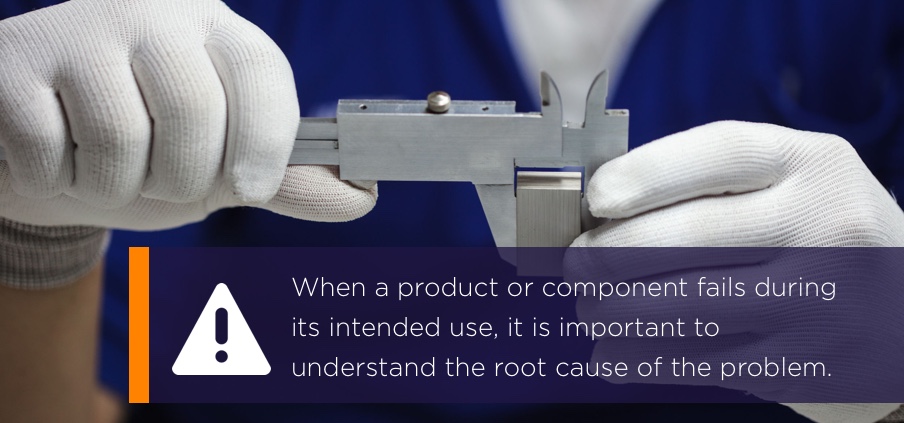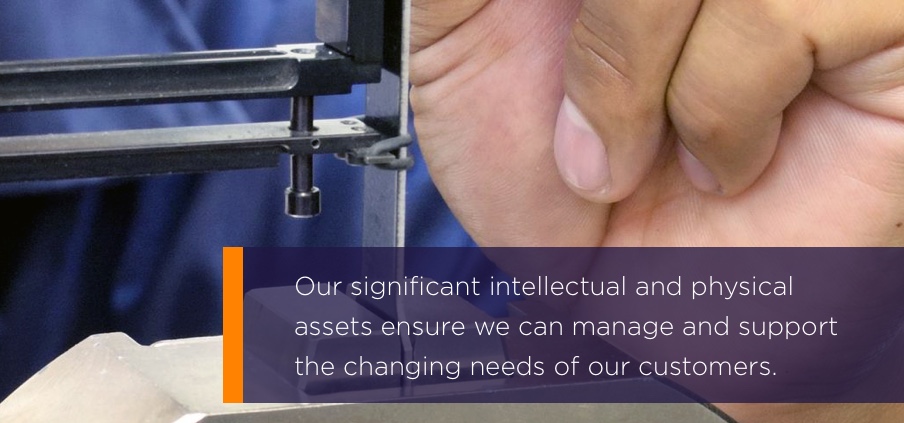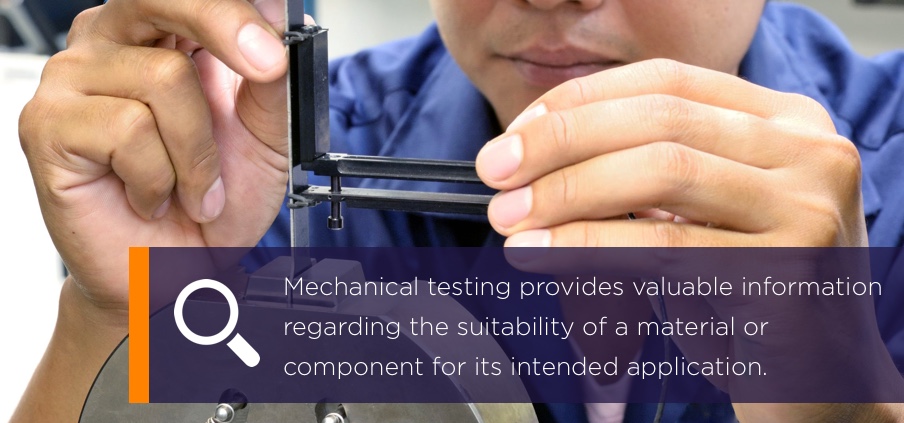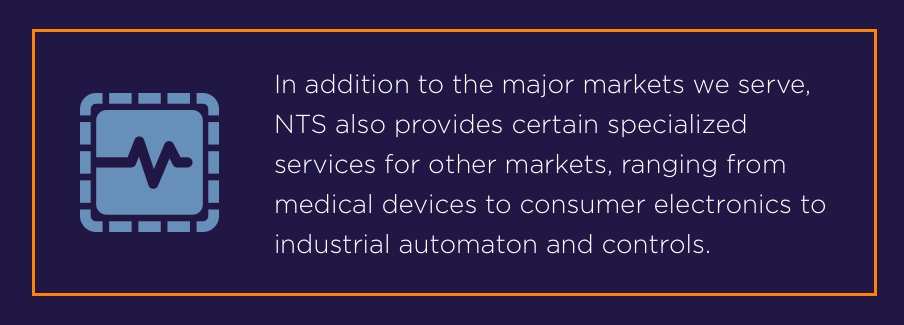Mechanical Testing Services
The physical and mechanical testing of a product comprises a critical part of the product and development process. Applied physical force such as vibration, shock stresses, and strain can reveal the inelastic behavior of the material. Mechanical testing allows the product developers to understand the product better, identify vulnerabilities, and establish stronger quality control. Mechanical testing employs a variety of strength tests that can determine the suitability of a material or component for the intended application. It measures characteristics such as elasticity, tensile strength, elongation, hardness, facture toughness, impact resistance, stress fracture, and the fatigue limit.
GVIRL can perform mechanical testing as an independent analysis or in combination with environmental stimulation, including:
- Adhesion
- Bond Strength
- Break Strength
- Compressive Strength
- Differential Scanning Calorimetry (DSC)
- Ductility
- Durability
- Dynamic Mechanical Analysis (DMA)
- Elongation
- Flexibility Endurance
- Flexural or Bend
- Flexural Fatigue
- Flexural Strength
- Folding Flexibility
- Fracture Toughness
- Glass Transition Temperature by TMA
- Impact Strength
- Lap Shear
- Material Characterization
- Peel Strength
- Rework Simulation
- Shear Strength
- Tensile Strength
- Tension and Compression
- Terminal Strength
- Thermo Gravimetric Analysis (TGA)
- Thermo Mechanical Analysis (TMA)
- Tensile Impact
- Young’s Modulus

It is critical for organizations to understand under what conditions components will suffer structural failure and deplete their functionality. There are three primary reasons why a component can become dysfunctional:
- Excessive deformation (elastic or inelastic) — This condition depends on the elastic characteristics of the material. Excessive elastic deformation may occur under loading conditions of stable equilibrium like the excessive deflection of a steel beam. This type of failure can also transpire under the loading condition of unstable equilibrium — bucking of a column or brittle fracture.Excessive inelastic deformation depends on the plastic properties of the material — ultimate tensile strength, strain hardening and hardness. This failure may occur under load conditions that cause fatigue, ductile facture and creep.
- Fracture — This type of failure occurs because of alternating stresses or strains, which can lead to crack initiation. Stress raisers or defects in the material can further encourage the growth of the crack.
- Wear — Mechanical wear can be found at contact interfaces of load-bearing components.
The scope of mechanical testing can range from characterization of material properties to certification of the integrity of final products and safety. Mechanical testing provides valuable information regarding the suitability of a material or component for its intended application. Mechanical testing can also make your design process more efficient and cost-effective. In addition, mechanical testing contributes to product excellence, safety and technological innovation.
GVIRL Mechanical Testing Laboratory Capabilities

Mechanical testing can help you expand the boundaries of performance in your products and components. GVIRL mechanical testing expertise gives you the confidence you need on future performance and safety. We have a global reputation based on technical capabilities and service, integrity and the quality of our results. In sectors like aerospace, defense, medical devices and other industries, there is no room for error. GVIRL engineers work closely with our customers to understand their operational and commercial needs, which enable us to deliver the results and the customer satisfaction they expect every time.
Some of the different areas in which we can perform test services include:
Materials Testing — Metals, alloys, polymers, plastics, glass, and other materials possess diverse properties, which make it critical to characterize and evaluate the quality and performance of the material or product in order to determine the suitability for intended application, life expectancy, or to resolve failure or contamination issues. GVIRL has a nationwide network of professional material testing labs with material analysis expertise and experience that encompass a variety of industries, such as automotive, defense, telecommunications, and consumer services. Our material analysis experts can perform a wide range of testing services, including
- Shear
- Thermal
- Flexure
- Ozone and Gas Exposure
- Tensile/Compression
- Corrosion
- Fatigue
- Impact
- Flammability
We can also work with you to develop a custom testing regimen for general quality assurance or for pre-compliance with ISO or other standards,
Polymer Testing — Advances in material science have resulted in a broad array of material to replace metal in products and parts for applications in a variety of industries. GVIRL has the ability to test and analyze plastics, rubber and other polymer materials. We can verify performance properties to determine functionality and to predict performance over time. We use various types of polymer testing and analysis to identify base materials and additives, verify material hardness and tensile strength and assess product features.
Dimensional Metrology — When you need to verify dimensional measurements of surfaces, internal and external thread and ensure certain features — such as machined products, components and fasteners — meet the necessary specifications. GVIRL can conduct first article, third party Coordinate Measuring Machine (CMM) and traditional hand tool inspections.
Calibration — We have the capability to deliver NIST-traceable and A2LA-accredited calibration services in an environment-controlled laboratory to ensure reliable readings. We can calibrate most gauges as well as measuring tools and electrical, temperature, torque, force, mass and humidity, masters and pressure instruments.
Failure Investigation — When a product or component fails during its intended use, it is important to understand the root cause of the problem. GVIRL can perform the necessary analysis and inspection. We will provide a comprehensive root cause analysis report, which will list all findings from our investigation and ensure you have the answers you need to prevent a recurrence.
We document all test results in detailed Certified Test Reports.

What Are Types of Mechanical Testing?
To ensure materials and products perform accordingly, there are different types of mechanical testing they may undergo:
- Fatigue testing — Depending on the source, fatigue comprises between 50 and 90 percent of all mechanical failures. Fatigue testing describes a testing method performed on parts and products to determine the localized and progressive structural damage that happens when a material is subjected to cyclical loading. We can perform this test at various levels of the manufacturing process, including standard testing methods during testing of the raw material. The objective is to develop a fatigue strength curve, which demonstrates the material’s resistance to cyclic loading over varying stress levels. Our fatigue testing capabilities include axial, torsional, high-cycle, low-cycle, bending, rotating, shear, proof load, and multiple degree of freedom.
- Tensile testing — This type of mechanical testing measures the force required to pull an object — such as a rope, wire or beam — to the point that it breaks. The tensile strength is the maximum amount of tensile stress that the object can withstand before failure — an important concept in mechanical engineering, structural engineering and material science.Tensile testing subjects a sample to uniaxial tension until it fails. GVIRL tensile testing capabilities include axial tensile testing, weld tensile testing, wedge tensile testing, castings tensile testing, elevated temperature tensile and tensile testing for machined specimens. Many companies utilize the results of tensile tests, and along with failure theories, to predict failure of components that are prone to more generalized stress conditions.
- Hardness testing — This technique is commonly used to test heat-treated surfaces to verify conformance and to measure how resistant a solid matter is to different kinds of shape change or penetration upon the application of force to the material surface.One of the most common methods is called microindentation hardness testing or microhardness testing. The method uses a precision diamond indenter that can be impressed in a range of loads into material. The testing expert measures the impression length and uses the information along with the test load to calculate the hardness value. Other hardness testing methods include Rockwell standard testing, Rockwell superficial testing and Brinell hardness testing.
- Compression testing — Refers to a technique that determines the behavior of materials under a compressive load to determine elastic limit, proportional limit, yield point, yield strength and compressive strength (if applicable). The test engineer loads the specimen between two plates, and then has a force applied to the specimen by moving the crossheads together.
Fracture mechanics — It is only a matter of time before machine parts crack. Fracture mechanics helps to determine the severity of a flaw and recognize when it becomes a problem. Many industries require manufactures to gather empirical data concerning a material’s ability to resist cracking and crack growth. Fracture testing is commonly employed by companies to develop maintenance schedules and forecast the service life of parts.
GVIRL offers a full range of mechanical tests. With a global network, GVIRL can handle standard testing requests or customize a testing protocol to meet your needs.
What Are Mechanical Testing Methods and Specifications
- Abrasion ASTM D4060, D1242, D1044, C501, IPC-TM-650, Method 2.4.27.1, 2.4.27.2
- Adhesion ASTM D429, IPC-SM-840, IPC-TM-650, Method 2.4.1, 2.4.1.1, 2.4.1.2, 2.4.1.3, 2.4.1.4, 2.4.10, MIL-I-46058
- Bearing Strength
- Bend Testing ASTM D747, ASTM D790
- Bond Strength IPC-TM-650, Method 2.4.40, 2.4.20, 2.4.21
- Bow and Twist IPC-4101, IPC-6012, IPC-TM-650 Method 2.4.22, 2.4.22.1
- Breaking Strength ASTM D5035, D638
- Brittleness ASTM D746, D1790
- Burst Testing ASTM D751
- Cable Endurance
- Climbing Drum Peel ASTM D1781
- Coating Thickness XRF, Microsection
- Coefficient of Friction ASTM D1894
- Coefficient of Thermal Expansion (CTE) ASTM E831, ASTM D696, IPC-TM-650, Method 2.4.24.5, 2.4.41, 2.4.41.3, 2.4.41.4
- Compression Set ASTM D395
- Compression Properties ASTM D695, D575, D1621, E209, E9
- Contact Actuation
- Cross-section Analysis ASTM B263, IPC-6012, IPC-6013, IPC-6018, IPC-TM-650, Method 2.1.1, MIL-P-50884, MIL-PRF-55110, MIL-PRF-31032
- Cure IPC-TM-650, Method 2.4.25
- Deflection Under Load ASTM D621
- Deformation Temperature ASTM D648
- Dimensional Stability IPC-TM-650, Method 2.2.4, 2.4.39
- Ductility IPC-TM-650, Method 2.4.2, 2.4.2.1
- Durability
- Elongation ASTM D897, D2095, D638, D3039, D1623, D412, D882, E8, E21, IPC-2.4.18, 2.4.19
- Endurance
- Engaging and Separating Forces MIL-A-28870
- Fatigue Life
- Flexibility Endurance IPC-TM-650, Method 2.4.3; MIL-P-50884, IPC-6013
- Flexural Properties ASTM D790, D1184, IPC-4202, IPC-TM-650, Methods 2.4.2.1, 2.4.3, 2.4.3.1, 2.4.3.2, 2.4.4, 2.4.4.1
- Hardness ASTM D785, E10, D2240, E384, D3363, E18, E92, IPC-SM-840
- Impact Resistance ASTM D256
- Insertion and Withdraw MIL-A-28870
- Lap Shear Strength ASTM D1002
- Mechanical Cycling
- Mechanical Strength ASTM D897, D2095, D638, D3039, D1623, D412, D882, E8, E21, IPC-TM-650, Method 2.4.18, 2.4.19
- Microhardness ASTM E384
- Microsectioning ASTM B263, IPC-6012, IPC-6013, IPC-6018, IPC-TM-650, Method 2.1.1, MIL-P-50884, MIL-PRF-55110, MIL-PRF-31032
- Peel Strength ASTM D3330, D903, D1876, IPC-TM-650, Method 2.4.8, 2.4.8.1, 2.4.8.2, 2.4.8.3, 2.4.9
- Plating Thickness XRF
- Pushbutton Durability
- Rework Simulation IPC-TM-650, Method 2.4.36, IPC-6012, IPC-6013, MIL-P-50884, MIL-PRF-31032, MIL-PRF-55110
- Shear Properties ASTM D732, ASTM D1002
- Softening Point
- Surface Roughness
- Tear Strength ASTM D1004, D1938, D1922, D2582, D624, IPC-TM-650, Method 2.4.16, 2.4.17, 2.4.17.1
- Tensile Properties ASTM D897, D2095, D638, D3039, D1623, D412, D882, E8, E21, IPC-TM-650, Method 2.4.18, 2.4.19
- Torque/Torsional Strength IPC-TM-650, Method 2.4.42
To support your mechanical testing needs, GVIRL also offers a variety of chemical testing and analysis, including:
- Alloy Composition: IPC/J-STD-001, IPC/J-STD-006
- Bisphenol A Content: GCMS
- Bonding: IPC-TM-650, Method 2.4.9.2
- Chemical Resistance / Solder Resistance: ASTM D543, IPC-SM-840, IPC-4101, IPC-TM-650 Method 2.3.2, 2.3.32.3.4.2, 2.3.4.3
- Cleanliness / Ionic Impurities: IPC-TM-650, Methods 2.3.25, 2.3.26, 2.3.28, 2.3.28.1, 2.3.28.2. Delphi-Q-1000-119, Delphi-Q-1000-127
- Composition: IPC/J-STD-004, IPC-TM-650, Method 2.6.15, 2.3.32
Density/ Specific Gravity: ASTM D792, IPC-TM-650 Method 2.3.5 - Flammability: UL94, ASTM D635, ASTM D2863, IPC-4101, IPC-SM-840, IPC-TM-650 Methods 2.3.8, 2.3.8.1, 2.3.9, 2.3.10, 2.3.10.1, 2.3.29
- Hazardous Substance Analysis: RoHS/WEEE, CPSC, REACH
- Heavy Metals/Lead Content: ASTM E1613, CPSC-CH-E1002-08.2, CPSC-CH-E1003-09.1, CPSC-CH-E1001-08.2
- Ion Chromatography (IC): IPC-TM-650, Method 2.3.28, 2.3.28.1, 2.3.28.2. Delphi-Q-1000-119, Delphi-Q-1000-127
- Organotin Content: GCMS pH: IPC-TM-650, Method 2.3.30
- Phthalate Content: CPSC-CH-C1001-09.3
- Porosity: ASTM B735, IPC-TM-650, Methods 2.3.24, 2.3.24.1, 2.3.24.2
- Purity: IPC-TM-650, Method 2.3.15, IPC-6012, IPC-6013, MIL-PRF-31032
- High Voltage Arc Tracking: UL746A
- Resistivity of Solvent Extract (ROSE): IPC-TM-650, Method 2.3.25, IPC-6012, IPC-6013, IPC-6018, J-STD-001
- RoHS: GCMS, ICP-OES
- Solderability: IPC/J-STD-002,IPC/ J-STD-003, IPC-SM-840
- Tack / Slump / Wetting / Dryness / Spitting: IPC/J-STD-005, IPC-TM-650, Method 2.4.35, 2.4.44, 2.4.46, 2.4.47, 2.4.48
What Industries Benefit From Mechanical Testing?
In addition to the major markets we serve, GVIRL also provides certain specialized services for other markets, ranging from medical devices to consumer electronics to industrial automation and controls. If you cannot find the special services you are looking for here on our website, please contact us directly for more information. Here are some examples of other markets that GVIRL services with specialized services for Testing, Certifications and Supply Chain Management:
Aerospace & Defense — The defense and aerospace industry requires engineers to work with a broad selection of metals, composites and other materials. GVIRL works with defense and governmental agencies to provide testing and certification for Tier I and Tier II suppliers for numerous industrial, commercial and military applications, including tensile testing, fracture mechanics, fastener testing, composite testing and fatigue testing. We also provide customized test procedures to meet customer specifications and help them meet performance goals.
Automobile Industry — Automobile manufacturers are under constant pressure to create vehicles that offer greater fuel economy, which requires design engineers to constantly search for lighter materials. At GVIRL, we provide timely and precise material testing, such as composites testing, fatigue testing, fastener testing, tensile testing, fracture mechanic testing and other methods to ensure you can meet strict SAE and ASTM standards.
Medical Devices — GVIRL can ensure you meet the most demanding test requirement in the industry in accordance with FDA, ASTM, CE and ISO guidelines. With a network of highly-trained testing experts, we can provide test design, execution and documentation via our thorough certifiable quality program to help medical device manufacturers’ fast-track submissions to the FDA and other governmental agencies — from test protocol development and prototype/feasibility trials to testing for regulatory agency submittals.

Other industries that can benefit from GVIRL mechanical testing and certifications services include:
- Composite materials power
- Generation & energy
- Alternative energy and clean products market
- Consumer electronics industry
- Voting systems
GVIRL provides companies and government organizations throughout the world with process and product compliance services, testing services, and program management support. Our significant intellectual and physical assets ensure we can manage and support the changing needs of our customers — just as we have been doing for the last 50 years and look forward to doing for 50 more.
If you have questions about testing or want to learn more about getting your product tested, call us at contact@gvirl.com or visit the contact page of the GVIRL website to reach sales, customer service or request a quote.
 Client Login
Client Login